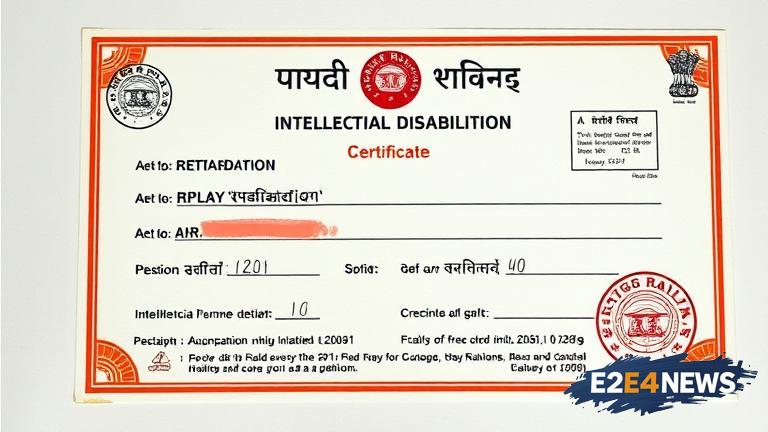In a move to promote inclusivity and respect for individuals with disabilities, the Indian Railways has amended its certification process to replace the term ‘retardation’ with ‘intellectual disability’. This change is aimed at reducing stigma and promoting a more respectful and dignified approach towards individuals with intellectual disabilities. The decision was made after a directive from the Ministry of Social Justice and Empowerment, which emphasized the need to use respectful and dignified language when referring to individuals with disabilities. The Indian Railways has been issuing certificates to individuals with disabilities, which provide them with concessions and benefits while traveling by train. However, the use of the term ‘retardation’ was seen as derogatory and stigmatizing, and the amendment is a welcome move towards promoting inclusivity and respect. The change is also in line with the United Nations Convention on the Rights of Persons with Disabilities, which emphasizes the need to promote equality and dignity for individuals with disabilities. The Indian Railways has been working towards making its services more accessible and inclusive for individuals with disabilities, and this amendment is a significant step in that direction. The change is expected to have a positive impact on the lives of individuals with intellectual disabilities, who often face stigma and discrimination in their daily lives. The amendment is also a reflection of the changing attitudes towards disability in India, where there is a growing recognition of the need to promote inclusivity and respect for individuals with disabilities. The Indian government has been taking several steps to promote the rights of individuals with disabilities, including the passage of the Rights of Persons with Disabilities Act, 2016. The act provides for equal opportunities and protection from discrimination for individuals with disabilities, and the amendment by the Indian Railways is a significant step towards implementing the provisions of the act. The change is also expected to have a positive impact on the education and employment opportunities for individuals with intellectual disabilities, who often face barriers and stigma in accessing these opportunities. Overall, the amendment by the Indian Railways is a welcome move towards promoting inclusivity and respect for individuals with disabilities, and it reflects the growing recognition of the need to promote equality and dignity for all individuals, regardless of their abilities. The change is a significant step towards creating a more inclusive and respectful society, where individuals with disabilities are valued and respected as equal members. The Indian Railways has set an example for other organizations and institutions to follow, and it is hoped that this change will have a ripple effect and lead to similar changes in other areas of society. The amendment is a testament to the power of advocacy and activism, and it shows that collective efforts can lead to significant changes in policies and practices.
